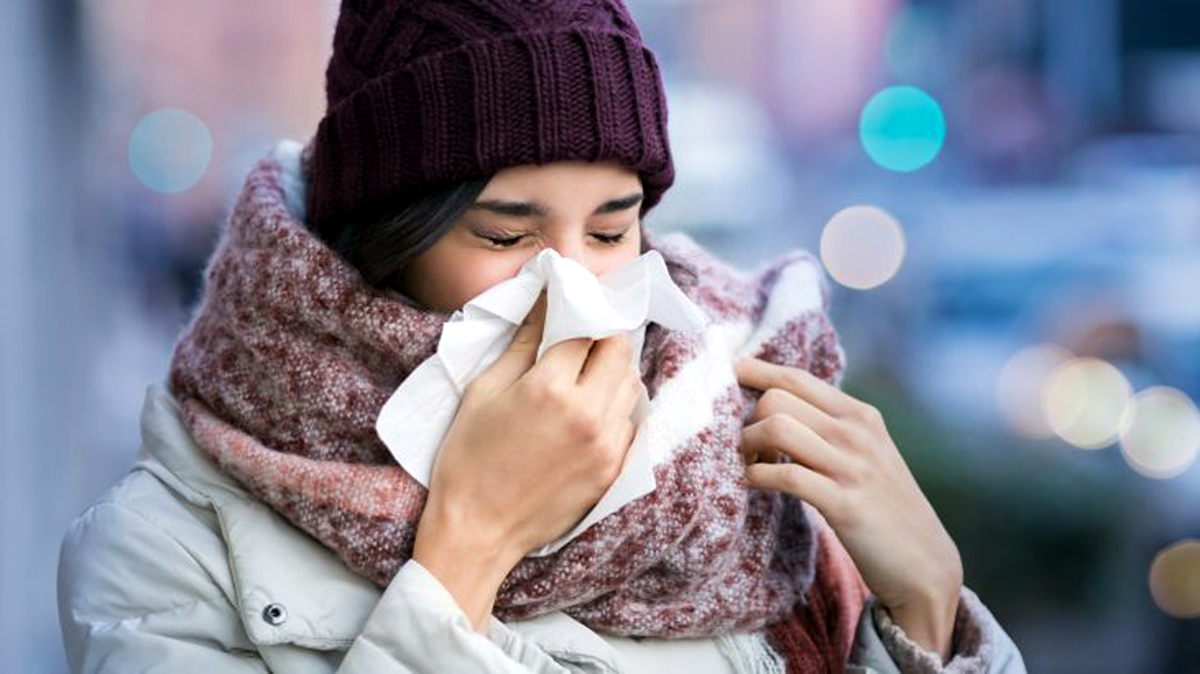Dr. Tasaduq Itoo
The cold and flu season is starting to rear its ugly head and we can’t seem to get away from the coughing and sneezing. But why are we prone to get the sniffles during winter? Viral infections that cause the common cold or the flu are a nuisance.
According to the Centers for Disease Control and Prevention (CDC), “Common colds are the main reason that children miss school and adults miss work” each year. While most colds tend to go away by themselves, every year, the flu kills an estimated 250,000 to 500,000 people worldwide.
Seasonal Patterns
The CDC monitor flu activity closely. Influenza can occur at any time of year, but most cases follow a relatively predictable seasonal pattern. The first signs of influenza activity usually start around October, according to the CDC, and often peak at the height of winter.
Viral infections are spread by
*Direct contact with an infected person
*Indirect contact such as touching a contaminated surface, and/or
*Exposure to an infected person who may be coughing or sneezing
How to stave off Viruses and treat Symptoms
Your chances of catching a cold this winter are very high. In fact, the CDC estimate that adults have two to three colds each year. The best way to protect yourself is by washing your hands with soap and water frequently, avoiding touching your eyes, nose, and mouth, and staying away from people who are already infected. These rules also apply to influenza. The CDC recommend a yearly flu shot as the best way of preventing infection.
Extra care should be taken by carefully washing all toys, books, and common surfaces to avoid the spread of infection in children. However, should you fall prey to a winter virus, here are some home remedies to consider to help ease your symptoms.
Home Remedies for Colds and Flu
*Garlic – anti-viral, antibiotic, and antiseptic.
*Onion – great for coughs and raw onion keeps the respiratory tract open.
*Ginger – antimicrobial and anti-inflammatory. In addition to treating cold/flu, ginger is excellent for nausea and vomiting.
*Sage – carminative, antiseptic, and astringent – the mouth and throat plant. Used for sore throats and cough. Also used for sinus congestion. Sage should not be used when pregnant or breast feeding.
*Thyme – antimicrobial, antibacterial, antiviral, expectorant, and astringent. Thyme is great for respiratory infections and coughs. It is also good for the stomach and relieves gas.
*Cayenne powder – stimulant, anti-microbial, analgesic, carminative, diaphoretic, and expectorant. Cayenne can help prevent a cold or flu as well as shorten the duration of a cold or flu. It brings heat to the body, which can help dispel coldness.
*Honey – raw, local honey should ideally be purchased either at a farmer’s market or at Whole Foods or Trader Joes. Honey is antibacterial, antimicrobial, and antiseptic. Do not give honey to children under 1 year old.
*Lemon – high in vitamin C, lemon may help decrease the strength of the cold and flu virus in the body and reduce phlegm. Many folks use lemons to build resistance to cold and flu, and speed up healing.
*Coconut oil – Its naturally high levels of lauric acid, which the body converts into a compound that has potent antimicrobial properties, can help boost the immune system and ward off illness. It can be taken with food, melted into hot tea or eaten straight out of the jar.
*Fermented cod liver oil – High levels of omega-3s make this ideal for reducing inflammation, while the naturally occurring levels of vitamins A and D help boost immune health. During times of sickness, you can double the recommended daily dose for extra immune support.
*Warm liquids – Homemade bone broth, hot lemon water, and herbal teas all help boost the immune system and soothe you when feeling sick. Ginger is good for sinus trouble and congestion. Homemade cinnamon tea made with one tablespoon of cinnamon and one teaspoon of honey helps reduce coughing and congestion.
*Apple cider vinegar – Adding a tablespoon of apple cider vinegar, or lemon juice, to a glass of water helps to alkalinize the body. Creating an alkaline environment helps kill bacteria and viruses. Start drinking it at the first sign of illness and repeat several times a day until the symptoms subside.
*Nasal wash – When you have sinus congestion, excess mucous is unable to drain, which can lead to a bacteria buildup, swelling and stuffiness. Rinsing your nasal passages with filtered water helps to clear out excess phlegm, pollutants and bacteria, so your normal nasal mucosa can better fight infections and allergies.


